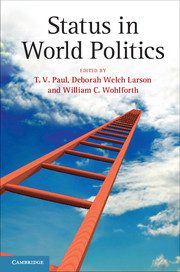Book contents
- Frontmatter
- Contents
- Figures
- Tables
- Contributors
- Acknowledgments
- Part I Introduction
- Part II Admission into the Great-Power Club
- Part III Status Signaling
- Part IV International Institutions and Status
- 7 Status Accommodation through Institutional Means: India’s Rise and the Global Order
- 8 Setting Status in Stone: The Negotiation of International Institutional Privileges
- Part V Status, Authority, and Structure
- Part VI Conclusions
- Index
- References
7 - Status Accommodation through Institutional Means: India’s Rise and the Global Order
Published online by Cambridge University Press: 05 June 2014
- Frontmatter
- Contents
- Figures
- Tables
- Contributors
- Acknowledgments
- Part I Introduction
- Part II Admission into the Great-Power Club
- Part III Status Signaling
- Part IV International Institutions and Status
- 7 Status Accommodation through Institutional Means: India’s Rise and the Global Order
- 8 Setting Status in Stone: The Negotiation of International Institutional Privileges
- Part V Status, Authority, and Structure
- Part VI Conclusions
- Index
- References
Summary
The rise of India as a state with major power attributes is expected to take place before the third decade of the twenty-first century. As its power capabilities – especially in the economic, military and demographic arenas – have begun to increase, India has started to make a claim for a leadership role in several institutions of global governance, and thereby for a higher status in the global system. Although it remains to be seen whether India lives up to its promise, and if so how willing it would be to bear the costs of such a role, New Delhi’s status claims are based on several hard and soft power resources, both actual and potential, which have been elaborated elsewhere. This claim is equally driven by ideational factors, as Indians in general have always had a tendency to view their country as destined to become a leading power, an ambition that many in the country have concluded will finally be achieved in the twenty-first century. Encouraging this perception are leaders of the United States and other Western countries who have started referring to India as a rising great power. In this chapter, we seek to answer a key question: Assuming India has the potential ingredients for great-power status, what are the prospects for its peaceful status accommodation?
- Type
- Chapter
- Information
- Status in World Politics , pp. 165 - 191Publisher: Cambridge University PressPrint publication year: 2014
References
- 25
- Cited by



